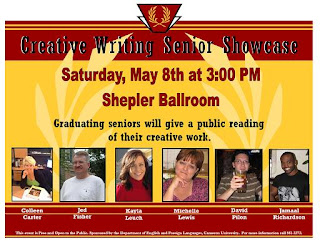

In 1997, I enrolled in English 364, Creative Writing: poetry. The professor: Valerie Martinez. It was her first year at the school. None of the students knew anything about her. She turned out to be serious but friendly. Intense but with a sense of humor. She didn't care that we couldn't write very well. She did care that we gave a sincere effort to improve. When I asked her if I could visit her during office hours to ask about additional poets I could read, she responded enthusiastically. When I showed up, she handed me a couple of xeroxed poems and we read them together. In class, she would make copies of poems that seemed to be in the spirit of our poetic attempts. She wanted us to have models. She also asked us to write an essay about a contemporary poet. She made it clear that reading and writing poetry were not separate acts. Later on, a friend and I started saying, "A writer who doesn't read is like a chef who hates vegetables." Or something like that (hopefully much funnier). The idea behind that joke is one that originated in Valerie's class for me. Writing is not an easy task; a person has to be willing to do all the things necessary if he or she expects to write well and improve.
There are so many inspiring moments I want to share with you here about Valerie Martinez, but mainly, I want to express that she is a caring, diligent teacher who, in 1997, just happened to be one of the strongest up-and-coming poets in the U.S. The start of her career was happening just as she was teaching our class.
Valerie's first book, Absence Luminescent, was published in 1999 by Four Way Books, and she had just received notice that it had won the Larry Levis Prize when our class began. At the same time, she was included in a major Latino/a anthology called Touching the Fire (Random House, 1998), edited by Ray Gonzales, a well-know poet and anthology editor. I bought that book as soon as it came out and was mesmerized that one of the poets was my teacher. I dreamed of being a published author.
One day, Valerie mentioned that she earned a Master of Fine Arts (MFA) in creative writing from the University of Arizona. I asked her about it. Honestly, I can still remember my thoughts when she began explaining her MFA experience. I thought, "This sounds like the greatest thing I've ever heard of." Despite being a brand-new to poetry and not having written a single thing that my teacher would refer to as a "poem," I wanted to be in the MFA environment. Valerie offered to advise me about the application process. A year later when I walked into her office and said I had been accepted at a school in Minnesota, she hugged me then walked into the halls and told each faculty member she could find about my news. Her excitement was surprising. And it was authentic. My experience has been that Valerie cares for her students as her top priority. Even after thirteen years, she is my teacher. I don't see or speak to her often, but she still shows the same concern she did when I was in her class.
As far as Valerie's own poetry, there are so many ideas I feel like I need to share. I will state this: Valerie Martinez writes tight, lyrical poems which emphasize sound at the same time that they stretch the limits of words: the ways in which words can be used and the ways they can be connected and attached to other words. This poem, "And Seeing It" has always been one of my favorite poems.
"And Seeing It" ©1999
Orange, orange. And the hand arching up
to hold it. The woman's hand. The arching.
Up. And the star exploding, seeing it
where it wasn't, a telescope on the night sky.
The thermonuclear flash.
The explosion.
She had her hand out; it fell
like an explosion into her fingers.
It wasn't the cope and the eye,
was hand, fruit. It was what I saw.
It was what I imagine I somehow saw.
Out on the horizon of stars beyond the gigantic sun.
Beyond the measure of the sun the star bursting.
And it was autumn. The shadows of oleanders
made colors of bodies on the lawn.
The girls dresses were red on the green lawn.
Smelling of fruit.
Making shapes of fruit in their hands.
With the sky all opaque, and the one star.
There, at the top of the fingers, the orange.
At the tip like God and Adam touching.
Like the ceiling of the Sistine where the stars might be.
And knowing about hydrogen, carbon.
A collapsing in. The water drunk by girls,
the breath given out. Breath, out.
The table of elements served up.
Iron in spinach in the aqua bowl.
Green explosion in the aqua bowl.
Clusters of grape stems without grapes.
Molecular models like grape stems.
To what we address, link.
To what we speak.
Not in our lifetime will we see it.
Not in the sky like this: supernova.
Not ever again, they say.
Drops. The orange.
(from Absence, Luminescent)

